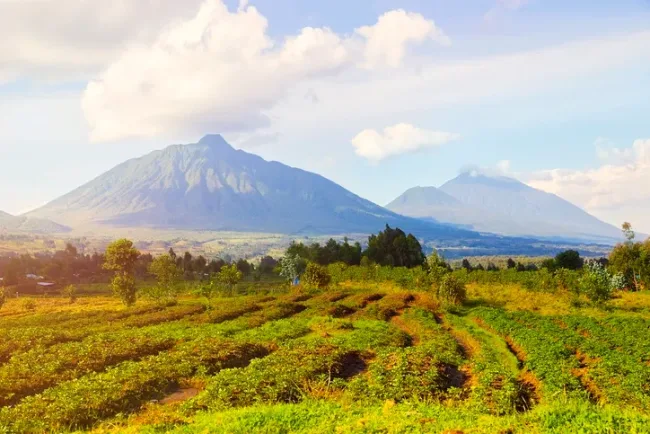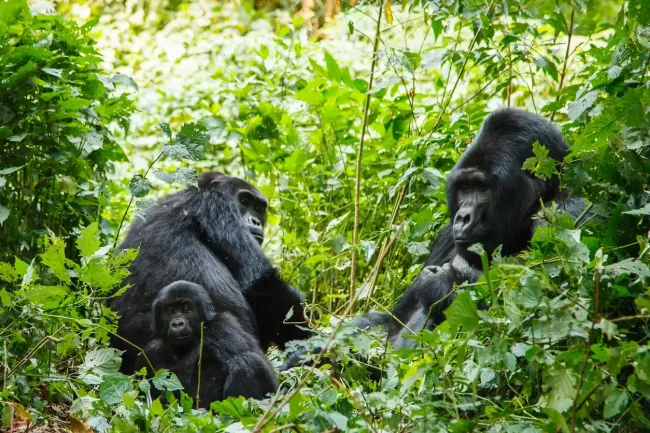
Rwanda
Welcome to Rwanda
Embarking on an adventure to Rwanda? Whether you're drawn to the vibrant city of Kigali, the ancient rainforests, or the majestic mountain gorillas, you'll likely need a visa. Discover the requirements, which visa suits your journey, and how to effortlessly apply with us.

What’s a Rwanda Conference eVisa and who’s it for?
Who’s the Rwanda Conference eVisa for?
Professionals and academics attending conferences, seminars, workshops, or meetings in Rwanda.
Who isn’t eligible for the Rwanda Conference eVisa?
Individuals not attending designated events or those seeking to engage in employment or tourism activities within Rwanda. Check your eligibility with our Visa Checker Tool.
What’s the purpose of the Rwanda Conference eVisa? The Rwanda Conference eVisa is designed to facilitate the entry of international attendees into Rwanda for:
- Conference attendance: Participate in professional gatherings, academic seminars, or industry-specific workshops. Not for employment or leisure travel in Rwanda.
How long can you stay with the Rwanda Conference eVisa?
This eVisa is usually valid for the event, typically up to 30 days per entry, allowing for a Single entry into the country.
What’s a Rwanda East Africa Visa and who’s it for?
Who’s the Rwanda East Africa Visa for?
Travelers seeking to explore Rwanda, Kenya, and Uganda with a single visa.
Who isn’t eligible for the Rwanda East Africa Visa?
Visitors not planning to travel between Rwanda, Kenya, and Uganda or those looking for employment within these countries.
What’s the purpose of the Rwanda East Africa Visa? The Rwanda East Africa Visa is intended for tourists wishing for:
- Multi-country tourism: Experience Rwanda, Kenya, and Uganda's diverse cultures, wildlife, and landscapes without needing multiple visas.
How long can you stay with the Rwanda East Africa Visa? This visa allows multiple entries between Rwanda, Kenya, and Uganda for up to 90 days per entry.
What’s a Rwanda Entry e-Visa and who’s it for?
Who’s the Rwanda Entry e-Visa for? Tourists, business visitors, or those visiting family in Rwanda for short stays.
Who isn’t eligible for the Rwanda Entry e-Visa? Individuals seeking long-term stays, employment, or study opportunities in Rwanda.
What’s the purpose of the Rwanda Entry e-Visa? The Rwanda Entry e-Visa enables:
-
Tourism: Exploring Rwanda’s natural beauty and cultural heritage.
-
Short business visits: Conducting brief business meetings or negotiations.
-
Family visits: Reconnecting with family members residing in Rwanda.
How long can you stay with the Rwanda Entry e-Visa? Generally issued for stays of up to 30 days, with the possibility of extensions. Single entry is standard.

What are the Rwandan long-term visa options?
Rwanda provides various long-term visa options for different needs, including work, study, family reunion, and residency. Here are some of the main long-term visas available:
-
Work Visa: For individuals who have secured long-term employment in Rwanda, sponsorship from the employer is often required.
-
Student Visa: Issued to foreign nationals pursuing long-term studies at Rwandan educational institutions.
-
Family Reunion Visa: Designed for family members of Rwandan citizens or residents wishing to live together in Rwanda.
-
Investor Visa: For foreign nationals investing a significant amount in Rwandan businesses or projects.
-
Long-Term Tourist Visa: Available for those wishing to stay in Rwanda for extended tourism purposes, often up to six months.
-
Special Pass: Granted for specific purposes such as research, internships, or volunteer work for a duration longer than what standard visas allow but shorter than residency permits.
-
Residence Permits: Offered to those seeking residency in Rwanda, available in categories like investors, retirees, or those joining family members.
While we do not provide these specific visas, you can find detailed information on Rwanda's long-term visa options, application procedures, and more on the Rwanda Directorate General of Immigration and Emigration website.

Staying healthy in Rwanda: Here’s what you need to know
Planning a visit to Rwanda? It's crucial to be informed about health guidelines to ensure a smooth and safe journey. Here's essential health information for travelers.
Make sure to stay updated on routine vaccines
-
Stay informed about Rwanda's COVID-19 requirements, including possible quarantine, testing, or vaccine documentation. Your airline can provide the latest updates.
-
Vaccinations for diseases such as yellow fever are required to enter Rwanda. Check for detailed information with health authorities or the Rwanda Biomedical Centre.
-
Depending on your itinerary, consider vaccines for hepatitis A and B, typhoid, and malaria prophylaxis. Visit the CDC's Travelers' Health page for Rwanda for recommendations.
Medical facilities
-
Rwanda's capital, Kigali, and other major towns have quality healthcare facilities, though more limited than in Western countries.
-
In rural areas, healthcare services can be sparse, and traveling to a city for medical care might be necessary.
-
Healthcare in Rwanda is not free for travelers, and medical services often require payment upfront. Ensure you have comprehensive travel health insurance that covers medical expenses in Rwanda.
-
Pharmacies are available in cities but may have a limited supply of medications. It’s advisable to bring the necessary prescription medications with you.
Health insurance
Securing health insurance before traveling to any destination, including Rwanda, is highly recommended.
While Rwanda has significantly improved healthcare, medical care can still be costly for travelers without insurance. Opt for a travel insurance policy with substantial medical coverage.
Before departure, verify that your insurance provides adequate coverage for your needs in Rwanda. Other considerations include:
-
Trip cancellation, delay, and interruption coverage.
-
Medical expenses and evacuation benefits.
-
Baggage loss or damage coverage.
Things to be aware of when visiting Rwanda
Keep an extra eye on the following to keep healthy and safe during your trip to Rwanda:
-
Malaria: Rwanda is a malaria-endemic country. Taking preventive measures such as using antimalarial medication, applying insect repellent, and sleeping under mosquito nets is crucial.
-
Water Safety: Drink only bottled or boiled water and avoid tap water to prevent waterborne illnesses. Also, be cautious with ice cubes and raw fruits and vegetables that may not have been washed with safe water.
-
Altitude in Kigali: Kigali and other parts of Rwanda are located at a high altitude, be cautious especially when traveling from a lower elevation, as it can result in altitude sickness, so take time to acclimate.
-
Cultural sensitivity: Rwanda has a complex history, especially regarding the 1994 genocide. Be respectful when discussing sensitive topics and seek to understand the country’s journey towards reconciliation and rebuilding.
-
Plastic bags: Rwanda has a ban on non-biodegradable plastic bags. Avoid bringing them into the country, as they can be confiscated at customs.
-
Conservation efforts: Rwanda is renowned for its conservation efforts, particularly for mountain gorillas; stick to the guidelines provided at national parks to minimize your environmental and wildlife impact.
Medication for personal use
To smoothly bring personal medications into Rwanda, follow these guidelines:
-
Declare all medications: Inform customs about any medication you bring into the country.
-
Original packaging: Keep medicines in original containers and carry them in your hand luggage where possible.
-
Prescription or doctor's letter: Carry a prescription or a letter from your doctor, ideally translated into English or French.
-
Check for restrictions: Confirm that your medications are legal in Rwanda by contacting the Rwandan embassy before traveling.
-
Quantity aligned with itinerary: Only bring a quantity of medication that matches the length of your stay to avoid any issues at customs.

 Australia ETA Online
Australia ETA Online
 United Kingdom ETA
United Kingdom ETA
 India Tourist eVisa
India Tourist eVisa
 Canada ETA Visa
Canada ETA Visa
 Turkey eVisa
Turkey eVisa
 Egypt eVisa
Egypt eVisa
 Singapore SG Arrival Card
Singapore SG Arrival Card
 Indonesia eVoa Visa
Indonesia eVoa Visa
 Aruba ED Card
Aruba ED Card

